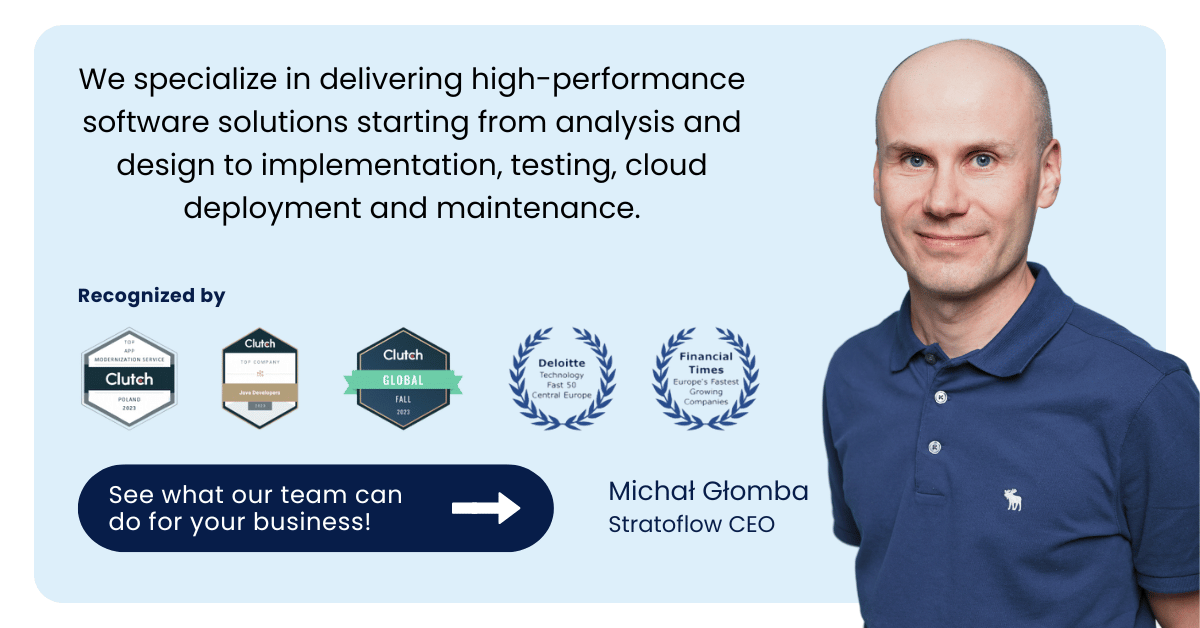
Introducing Product Recommendations in Your Business
Want to increase your e-commerce sales and improve the customer experience?
Introducing product recommendations can transform your business by providing personalized shopping experiences that drive engagement and conversions.
This article explores the best ways to effectively implement recommendation engines, offering practical tips and real-world insights.
Dive in and discover how personalized recommendations can revolutionize your online store and delight your customers.
Contents
- The Basics: What is the Recommendation Engine?
- Why it Matters: How Do Personalized Recommendations Drive Sales?
- Introducing Recommendation Engine in Your Business: Key Considerations
- Custom Product Recommendation Engine: Strategic Advantage For Your Business
- Best Ways of Presenting Product Recommendations to Your Customers: Eight Tips from Experts
The Basics: What is the Recommendation Engine?
Do you recognize these prompts: “Bestsellers”, “Top Picks for You”, “Often Bought Together”?
The products displayed in these boxes are provided to you by the site’s recommendation engine – software system designed to predict and suggest products or services to users based on their preferences and behaviors.
These engines use algorithms and data analysis to process large amounts of user data and display personalized product recommendations.
E-commerce companies use recommendation engines to improve customer satisfaction and increase sales by presenting relevant products at the right time.

For example, if you’re shopping online and see a section titled “Customers who bought this item also bought”, you’re seeing a product recommendation engine in action.
By suggesting items tailored to your tastes, these engines not only increase the likelihood of purchase, but also improve user engagement and retention.
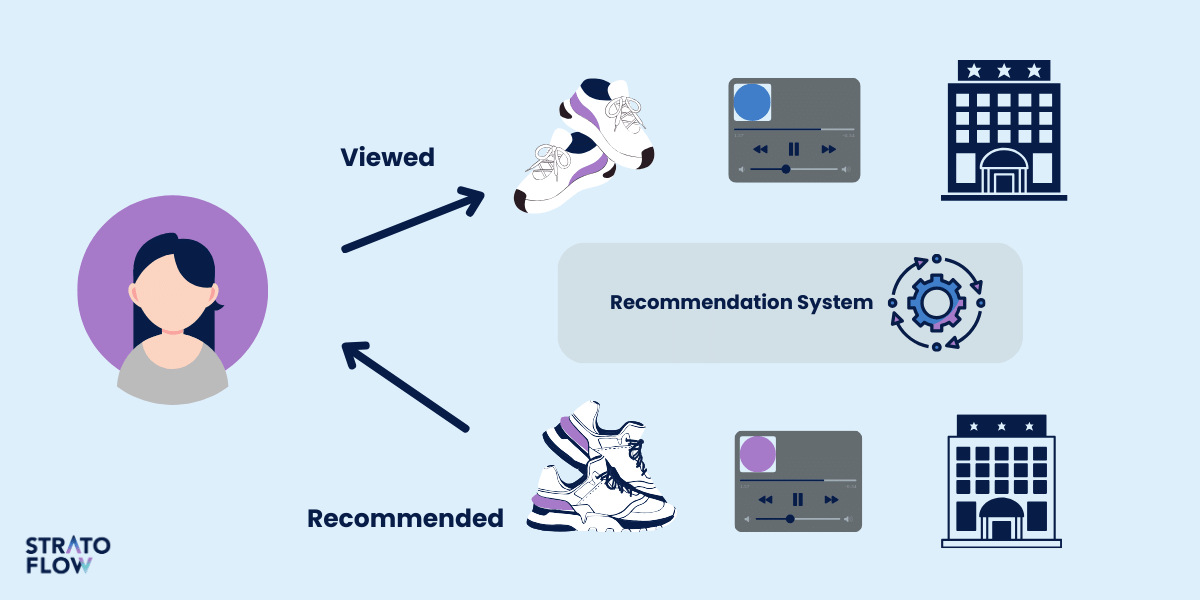
Leading e-commerce giants and media companies like Amazon and Netflix have mastered the use of product recommendation engines over the years of constant development and improvements, and it yielded substantial results.
Research has shown that roughly 80% of the hours streamed on Netflix come from personalized recommendations on the homepage.
Amazon product recommendation system on the other hand analyzes browsing behavior, behavioral data, and even product reviews to suggest products that match individual preferences. All of this has a huge impact on your company’s bottom line. Just how much? Let’s find out.
Why it Matters: How Do Personalized Recommendations Drive Sales?
By 2025, virtually all major players in the e-commerce market use personalized product recommendations engine in one form or another.
So it’s safe to assume that they must have a pretty significant impact on sales.
And they do. But to what extent do they drive revenue for these companies?
For example, Amazon’s recommendation algorithm, which analyzes user behavior in real time, is responsible for a staggering 35% of its total sales. The system, which uses item-to-item collaborative filtering, uniquely tailors the online store experience for each customer, presenting them with products based on their browsing and purchasing history.
According to Mailchimp, returning customers who engaged with personalized recommendations were 55% more likely to make a purchase during that session, demonstrating a significant impact on customer retention. For new customers, that likelihood increased to 70%.
This data underscores the critical role of personalization in retaining existing customers and converting new ones.
In addition, personalized recommendations can significantly reduce shopping cart abandonment rates.
With the average cart abandonment rate hovering just over 70%, personalized product suggestions based on client purchase history can address specific reasons for abandonment, such as unexpected costs or a lack of trust.
Finally, personalized recommendations significantly increase average order value (AOV).
Sessions that include engagement with personalized recommendations see an increase in AOV of up to 369%. By presenting relevant cross-sell and up-sell opportunities, such as suggesting complementary products at checkout, businesses can significantly increase total cart value.
Do you want to unlock the same benefits for your e-commerce business?
Empower Your Business With AI-Driven Recommendation Engine Today!
Introducing Recommendation Engine in Your Business: Key Considerations
So you want to tap into the same potential as all these
What should you consider when trying to deploy your own product recommendation engine to your e-commerce?
One of the first decisions you’ll have to make is whether to go with an out-of-the-box solution, an add-on to your existing platform, or a custom software solution tailored to your business needs.
Ready-made solutions and add-ons offer an attractive starting point due to their ease of implementation and relatively low upfront costs. These systems come pre-configured with essential integrations, enabling you to launch personalized recommendations quickly and with minimal technical know-how—making them ideal for smaller businesses or those just beginning to explore personalization.
However, as your business grows, the limitations of these off-the-shelf options can become apparent. They often lack the flexibility and scalability needed to accommodate evolving customer demands and expanding product catalogs.
Whet do we mean by that?
For example, a ready-made recommendation engine might not support a niche custom model designed for a specialty retailer that requires sophisticated algorithms to factor in unique product categories—such as artisanal craftsmanship or limited-edition features—resulting in generic suggestions that fail to capture the distinct value proposition of such products.
Custom software solutions provide the opportunity to build recommendation engines that are finely tuned to your specific business model and customer behavior. Although the initial investment and complexity are higher, custom solutions deliver long-term value by offering more accurate, effective recommendations.
Developing custom recommendation engine: A few grains of salt
But designing, developing, integrating, and deploying a custom product recommendation system is no small feat.
It requires a significant amount of knowledge and experience. It requires an understanding of complex algorithms, machine learning techniques, and data science principles.
That’s why it’s best to use the help of professionals experienced in this field.
Custom Product Recommendation Engine: Strategic Advantage For Your Business
At Stratoflow, we focus on delivering practical and tailored custom product recommendation engines that drive sales and reliver measurable results.
With over 10 years of commercial experience, we understand the value of personalized customer experiences and utilize advanced AI and machine learning techniques to turn our clients’ ideas into effective, scalable systems.
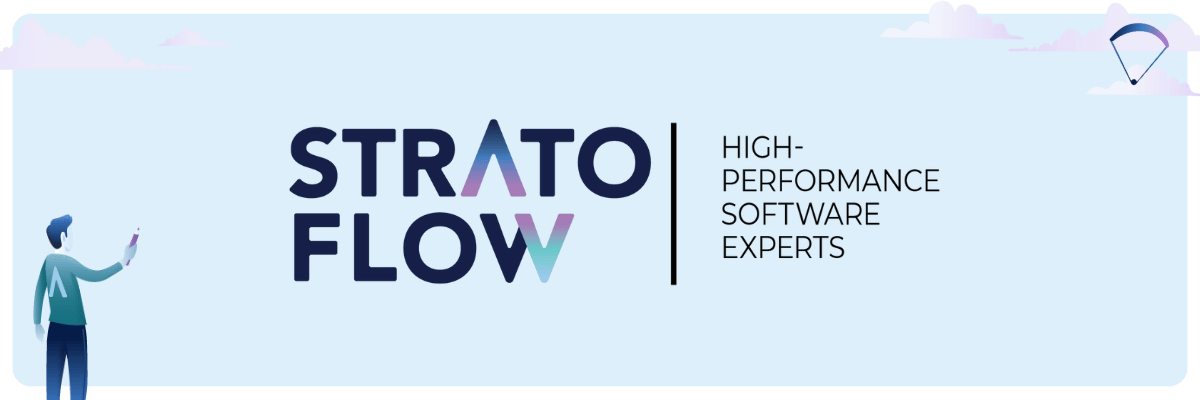
One example of our work is Recostream, our custom AI/ML-powered recommendation engine built on customer preferences.
The mission was simple – craft an advanced product recommendations engine accessible to e-commerce sites and content platforms of any size.
Recostream was designed to provide sophisticated product recommendations for e-commerce sites and content platforms of any size. Our development process involved evaluating and refining multiple recommendation models to ensure that the system not only delivers relevant suggestions but also adapts as customer behavior evolves.
Recostream was built using Openkoda development platform. That enabled us to leverage it’s robust analytics capabilitiues and integrations with Google Analytics and Google Optimize all while saving time on the development process itself.
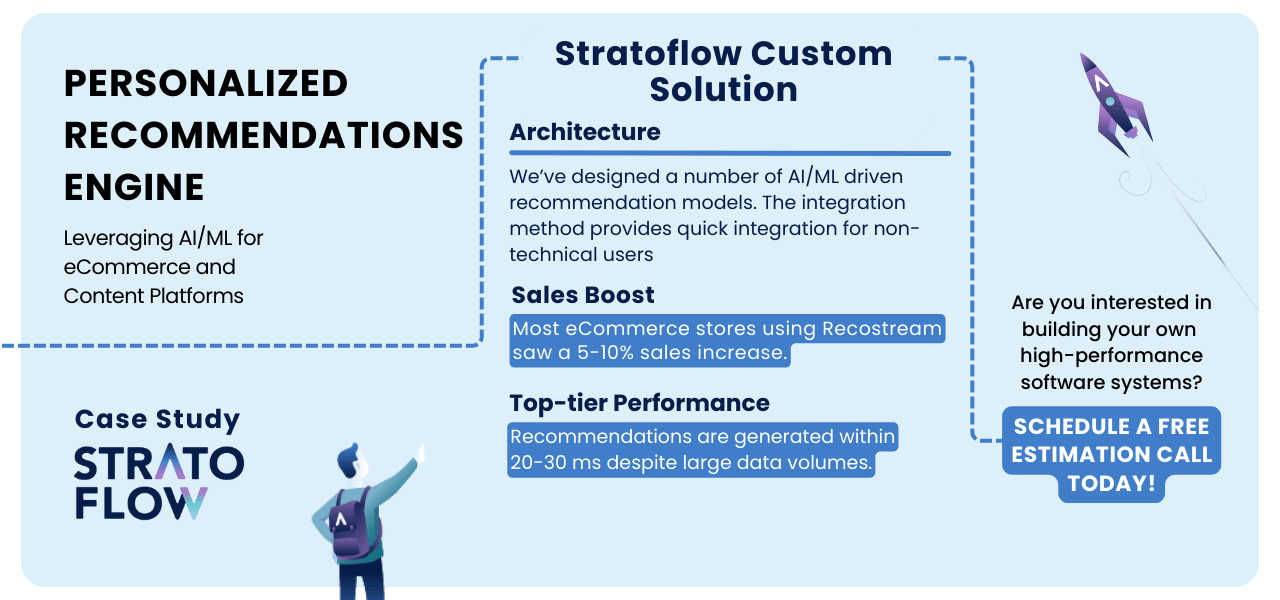
Recostream has helped e-commerce stores achieve a 5-10% increase in sales and boosted conversion rates for recommended products by around 25%.
Its real-time performance delivers recommendations in just 20-30 milliseconds, ensuring a smooth and responsive user experience.
These tangible benefits and seamless integration with any ecommerce site contributed to its strategic value, ultimately leading to its acquisition by GetResponse in 2022.
Power of personalization in other industries
But building recommendation engines is not limited only to ecommerce.
Custom recommendation engines improve the user experience, increase purchase intent, simplify the customer journey and drive business growth.
Here’s how different industries can benefit from these software systems:
- Ecommerce and Online retailers: By using power of personalization you can enhance user experience and drive sales by offering personalized product recommendations, making shopping convenient and enjoyable.
- Media and Entertainment: Increase user engagement and satisfaction with tailored content suggestions, keeping audiences hooked.
- Education: Boost student performance by providing customized learning pathways, ensuring each learner receives the support they need.
- Healthcare: Improve patient outcomes with personalized treatment plans, delivering precise and effective care.
- Online Advertising: Achieve higher conversion rates with personalized ads, targeting the right audience with the right message.
- Insurance: Offer custom financial advice and risk assessments, providing clients with personalized insurance solutions.
- Finance: Optimize investment advice and portfolio management, helping clients make informed financial decisions.
- Food Delivery: Enhance customer satisfaction with personalized menus and optimized delivery, ensuring timely and enjoyable dining experiences.
- Real Estate: Provide property recommendations and market analysis, helping clients find their ideal homes and investments.
If you’re considering developing and deploying a custom personalized product recommendation engine, don’t hesitate to get in touch with us.
We can guide you through the process of creating a scalable, tailored solution that enhances your customer experience and drives measurable business results.
Best Ways of Presenting Product Recommendations to Your Customers: Eight Tips from Experts
Fast data processing and effective presentation of product recommendations can significantly improve the user experience and drive sales.
At Stratoflow, we’ve gathered extensive insight and developed best practices for presenting product recommendations to maximize their impact.
Here we share our expertise on how to strategically present product recommendations to your customers.
Tip #1: Provide relevant recommendations on the product pages
One of the best places to show users product recommendations is on the product pages themselves. Product pages are where customers are most engaged and have the highest purchase intent. When users are looking at a specific product, they are often open to exploring additional items that complement their current selection or offer similar benefits.
Displaying relevant recommendations on product pages can significantly enhance the shopping experience by:
- Increasing Discoverability: Customers can discover related products they might not have searched for explicitly, increasing the chances of additional purchases.
- Boosting Cross-Selling Opportunities: Recommending complementary products, such as accessories or related items, can increase the average order value.
- Enhancing Customer Satisfaction: Providing relevant suggestions can make the shopping experience more personalized and enjoyable, leading to higher customer satisfaction and loyalty.
Best models to use here
- Similar Products: Suggest items that are similar in style, function, or category to the product being viewed. This helps users find alternatives and expand their choices.
- Other Customers Also Purchased: Display products that other customers commonly buy alongside the viewed item. This leverages social proof and encourages users to consider complementary products.
- Frequently Bought Together: Highlight items that are often purchased together with the current product. This not only increases the perceived value but also boosts the average order value through cross-selling.

Tip #2: Present customers with similar products
Presenting similar products to customers is a highly effective strategy that uses content-based filtering techniques.
This approach analyzes the attributes of products the customer has expressed interest in and suggests items with similar characteristics. It is particularly useful in scenarios where a customer has specific preferences or is looking for alternatives within a particular category.
In our experience at Stratoflow, we have seen significant success with this approach.
In one instance, a client’s online store specializing in electronic gadgets used content-based filtering to recommend similar smartphones to users looking at a specific model.
By analyzing features such as screen size, camera quality, and battery life, the recommendation engine suggested other smartphones with comparable specifications.
This strategy not only helped keep customers on the site longer, but also increased the likelihood of a purchase, as customers appreciated the tailored suggestions that met their specific needs.

Tip #3: Promote daily offers
Promoting daily deals through product recommendations is an incredibly effective way to harness the fear of missing out (FOMO), one of the most powerful tools in modern marketing.
FOMO drives customers to take immediate action to avoid missing out on a limited-time offer, increasing the urgency and likelihood of a purchase.
Product recommendations are an ideal way to highlight daily deals.
These product recommendations can be strategically placed on the home page of your site or as pop-up notifications for maximum visibility. By presenting limited-time offers in these high-traffic areas, you can capture customers’ attention as they enter your site or while they are actively browsing.
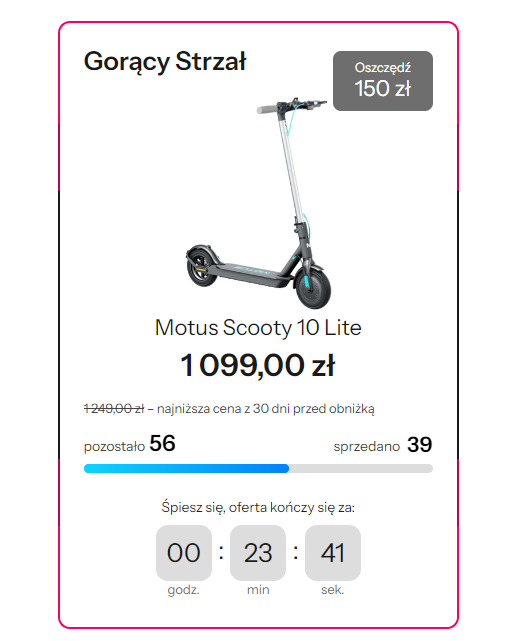
Tip #4: Show users what others are also buying
Showing what other users are buying is a powerful recommendation model that effectively drives cross-selling and leverages social proof.
This approach taps into the natural human tendency to follow the actions of others, building trust and encouraging purchases.
At Stratoflow, we implemented this recommendation model for a women’s apparel store.
By displaying items that other customers frequently purchased together, we were able to increase cross-selling opportunities and improve the overall customer experience.
For example, when a customer is looking at a dress, the recommendation system can display a section called “Customers Also Bought” with accessories, shoes, or other clothing items that complement the dress.
This not only introduces the customer to related products, but also increases the likelihood that they will add these items to their cart.
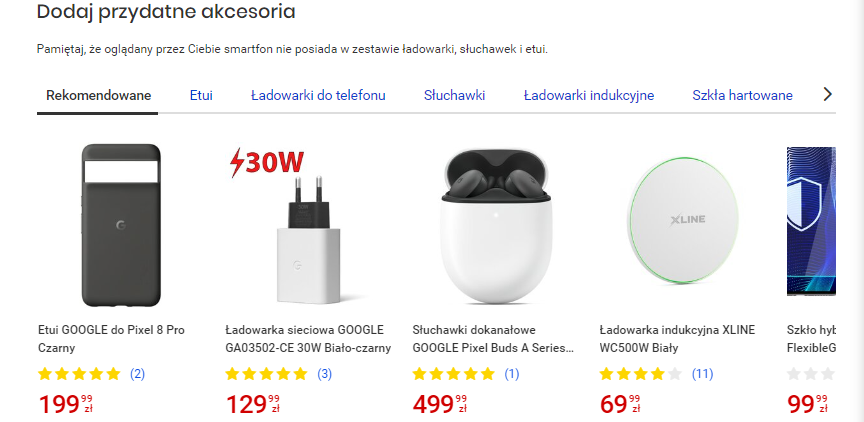
Tip #5: Integrate personalized pop-ups on the checkout page
Cross-selling and up-selling strategies are great ways of increasing the AOV in your shop and they can be achieved by integrating intelligent product recommendation pop-ups on the checkout page.
Placing these recommendations at the final stage of the purchase process allows you to present customers with complementary products, significantly increasing the average order value. Personalized pop-ups capture customer attention at a critical moment—when they are ready to complete their purchase.
For instance, if a customer is buying a laptop, a pop-up could suggest complementary items such as a laptop bag, an external mouse, or a software bundle. These timely, data-driven suggestions make it convenient for customers to find everything they need in one go, ultimately improving their overall shopping experience and boosting your sales.
By incorporating personalized pop-ups on the checkout page, you can effectively cross-sell and up-sell, resulting in higher average order values and a more satisfying customer experience.
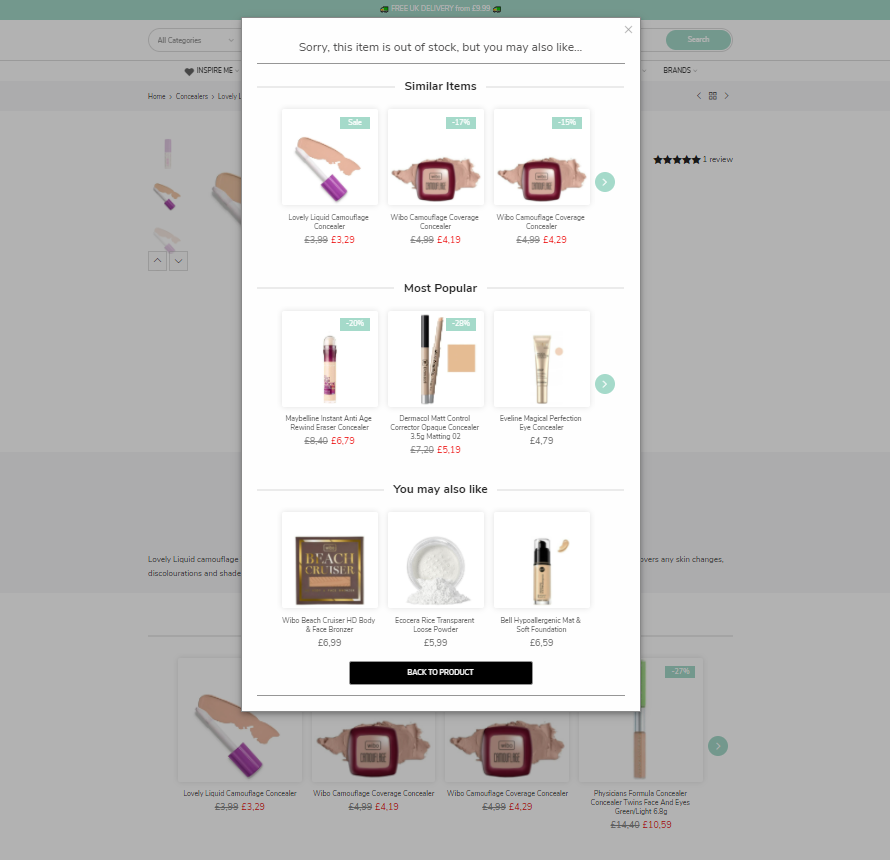
Tip #6: Highlight your bestsellers
Recommending best-selling products to users is another effective strategy that leverages the popularity and proven success of these items.
Highlighting bestsellers using product recommendation engine not only showcases the most popular products in your inventory, but also builds trust and encourages purchases by showing that these items are highly favored by other customers.
Benefits of Highlighting Bestsellers:
- Builds Trust and Credibility: Customers are more likely to trust and purchase products that are popular and have been widely bought by others. This social proof can significantly enhance their confidence in making a purchase.
- Increases Conversion Rates: Bestsellers have a proven track record of success, making them more likely to convert new customers. By recommending these products, you increase the chances of a sale.
- Optimizes Inventory Management: Promoting bestsellers helps ensure that popular items are continually moving, which can assist in better inventory management and stock turnover.
For one online toy store we worked with, integrating a bestsellers model proved highly effective.
We highlighted the most popular toys on the home page and product pages, using data-driven insights to ensure the recommendations were current and relevant.
This approach not only increased sales of these highlighted items, but also improved customer satisfaction by directing them to products that were highly rated and enjoyed by others.
[Read also: Online Shopping Recommendations – How to Introduce Them in Your Business?]
Tip #7: Recommend products based on reviews
Recommending products based on reviews is a powerful strategy that uses social proof to influence purchase decisions.
By displaying user ratings and reviews alongside product recommendations, you can highlight the popularity and quality of items, building trust and driving sales.
To implement this strategy effectively, display ratings (such as stars or numerical scores) and snippets of customer reviews next to recommended products.
For example, showing that a product has a 4.8/5 star rating or highlighting a few key positive comments can make a significant difference in influencing a customer’s decision.
In our experience, integrating review-based recommendations into various e-commerce platforms has consistently shown positive results.
Customers appreciate the additional information, and it helps them feel more confident about their purchases.

Tip #8: Integrate your recommendations with your store’s visual language
This is the last, but probably the most important tip of all.
Properly integrating product recommendations into your store’s visual language is critical to maintaining a seamless user experience. Poorly integrated recommendations can distract or even frustrate shoppers, ultimately detracting from the overall shopping experience.
That’s why, based on our extensive experience, we’ve compiled a list of 5 folder rules for smoothly integrating product recommendations into the page design like Netflix and Spotify has done in their pages.
Golden Rules of Presenting Product Recommendations
- Rule #1: Consistency with Visual Design: Ensure that the recommendation sections match the overall design of your website, including colors, fonts, and layout.
- Rule #2: Clear and Non-Intrusive Placement: Position recommendations where they are easily noticeable but do not obstruct the user’s browsing or purchasing process. Ideal spots include below product descriptions, sidebars, or in a dedicated section on the homepage.
- Rule #3: Use High-Quality Images: Visual appeal is critical in online shopping. Use high-resolution images for recommended products to ensure they look attractive and professional, encouraging users to consider them seriously.
- Rule #4: Incorporate Call-to-Action Buttons: Include clear and compelling call-to-action buttons like “Add to Cart” or “View Details” with each recommended product.
- Rule #5: Personalize the Recommendations: Tailor the recommendations based on individual user behavior and preferences. Personalized recommendations are more relevant and engaging, leading to higher conversion rates and improved user satisfaction.
[Read also: AI Recommendation Engine – How Artificial Intelligence is Transforming Modern Businesses]
Conclusion
Incorporating personalized product recommendations improves the user experience, increases sales, and builds customer loyalty.
By following our best practices and working with professional custom software development companies, you can create a dynamic shopping environment that delights customers and drives business growth.
Related Posts
- Inside the Netflix Algorithm: AI Personalizing User Experience
- Music Recommendation System: How Do Streaming Platforms Use AI?
- How to Use Ecommerce Recommendations to Drive Sales?
- Complementary Products: A Way to Increase Your Online Store Sales
- Custom Recommendation Engines: What They Are and How to Use Them
Thank you for taking the time to read our blog post!

